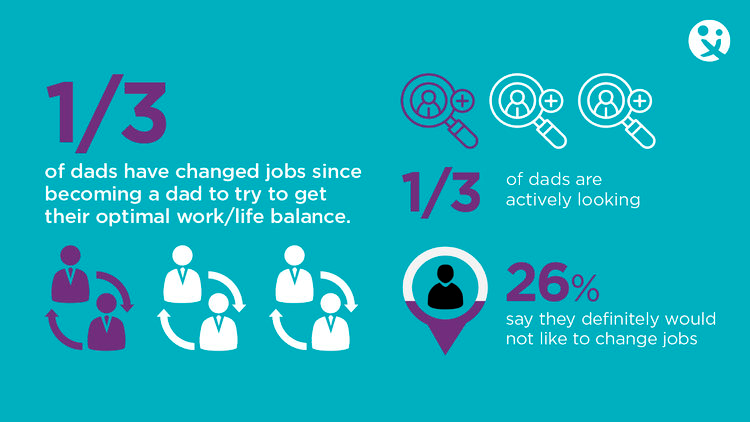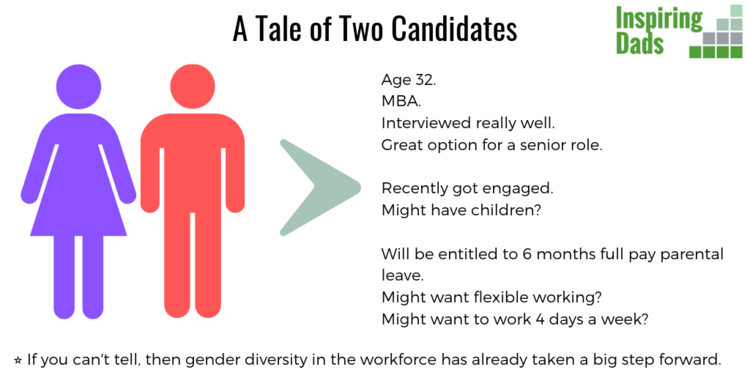Having just had Father’s Day, it’s worth reflecting on what dads really want. We know a lie in would be good, socks even better and maybe a novelty selection of real ales. But in terms of the workplace, dads just want to have options. Options about how to organise their working lives, without being told that they can’t raise their children or that being a committed dad means you can’t be committed to work.
A New Generation of Dads
A whole new generation of men want to be much more actively involved in raising their children. They expect equality in the workplace and at home and they are frustrated when their needs and the needs of their families can’t be met.
In short they want to be great dads and have great careers.
GQ magazine found that the number 1 aspect of modern masculinity, identified by 66% of Men was “being a present father”.
Source: GQ Magazine
But it can be tough when this desire to be an active present father is dismissed or not taken seriously…
Dads are changing jobs to get what they want.

Daddilife and Deliotte Report – THE MILLENNIAL DAD AT WORK
Not all men or families are the same.
Income and childcare priorities change and for many heterosexual couples the certainty of a man being fully committed to his career, while a female partner takes on the majority of the childcare can give great comfort and certainty.
However we do an enormous disservice to society, the workplace and individuals when we assume that men don’t want to be fully involved as parents. That attitude is no more valid or helpful than assuming that women only want to stay at home and look after children.
Choices!
We need to allow couples to make genuine choices – both for their own benefit and for benefits of building gender diverse workplaces.
When we cannot tell whether a man or a woman is more likely to take parental leave or seek flexible working, gender ceases to be an issue in hiring and promotion decisions.

The Good, the Bad and the Ugly.
As a man access to flexible work can be difficult to achieve. It can be seen as a perk of seniority or as something that solves a female childcare ‘issue’.
72% feared their employer’s reaction if they asked for flexible working.
Source: Workingdads.co.uk
But when it works well the benefits to the man, the family and their partner are clear to see as the ‘Good’ storyof Susha and Magnus and will show. The example of the ‘Bad’ show how a lack of flexibility for Dads will cost businesses their talent and the motivation and good will of their staff. Finally the ‘Ugly’ shines a light on the type of casual dismissive bias that one man faced trying to access part time work. It shows how attitudes towards men’s flexible and part time working desires can directly and negatively effect women’s aspirations.
Things will change but this Father’s Day we need to think about the next generation of Father’s Day.
“The current crop of male, mid-fifties business leaders are completely out of touch in respect to the changes to the role of the father that have taken place in the two decades since they were young dads.”
Source: Evening Standard Colo
The Good
Susha Chandrasekhar is a Senior Lawyer at the Department for Business.
Her husband is Dr Magnus Ryner, Professor of International Political Economy and Head of the Department of European & International Studies at Kings College, London
Their son is called Axel.
Susha kindly shared their story…
“I am a lawyer working part-time which is demanding since my responsibilities include EU issues. Fortunately, my husband’s (more than) full-time work can be carried out flexibly. He comes into and leaves the office at different times, works from home, and catches up on things in the evenings on the days he does the school pick-up. My husband is an academic which helps but professors have to teach, attend meetings, supervise students, undertake research etc. which require a physical presence in the office or a library. It’s still a juggling act.”
Here are the top 7 ways in which my husband’s flexible pattern improves my
life.
1. Morning mayhem
My husband does the morning shift and the school run. That pressure is off me as soon as I wake up which is always a good start. I do the evening routine of bath-book-bed.
2. School pick-up
My husband does two school pick-ups a week so there are least two days on which:
· I do not have to rush home and can deal with last minute work emergencies;
· My husband helps our son with his reading and maths homework; and
· There is dinner on the table for me when I come through the front door.
The other 3 weekdays on which I do the pick-ups, my husband gets these benefits in return.
3. Dealing with illness
It is not the default position that I drop everything and deal with a sick child. We see whose schedule is the more flexible. Sometimes it’s his.
4. Caring for Grandparents
There comes a time when our own parents need care. I value the chance to do this.
5. Finances
As we do the childcare ourselves, we do not need to employ a nanny which is expensive.
6. Reliability
If my husband says he will do something, he has the flexibility to do it. I feel assured it will be done without having to check up on it.
7. Frazzle factor
I can deal with the organisation of raising a child e.g. costumes, presents, dental appointments without too much stress. I also enjoy time with my family and friends instead of fretting non-stop about everything that needs to be done.
“No system is perfect and ours breaks down once in a while when the adventures of life are thrown at it. But one thing makes us truly happy. When our son cries out when he has a nightmare or has fallen over, he doesn’t just call for “Mummy, Mummy”, he calls for “Mummy-Daddy, Mummy-Daddy.” To him, we’re equally present, equally important. To us, his opinion is the most important one.”
The Bad – Losing Talented Staff
James wanted flexible working after the birth of his baby
He worked long hours for a private jet firm, but wanted more flexibility after his baby was born. While the official office hours were 9am to 6pm, in reality everyone was in the office until 8.30pm.
“If you didn’t do that it was frowned upon. I was struggling,” he says. He had been at the firm for four years and was one of its top sellers, so he asked for flexible working and expecting a positive response.
“I tried to talk to them several times, but it was always a blanket ‘no’ because they said others would want to do it too.”
In the end, he quit, and now the 28-year-old works for his father’s firm Bloomsbury Estates where he says he’s happy to work at home on weekends to catch up from when he leaves early in the week.
Source: BBC website
The Ugly – Trying to Get Part Time Work
‘Phil’ tried to get part time work in SW England so that he could support his partner’s work expansion plans by taking on more of the childcare responsibilities, including looking after a boy on the autism spectrum.
He struggled badly in the recruitment process and ended up having to take a full-time role.
Overqualified and bored?
Farcical the amount of times I have heard “overqualified” or “you would be bored” or “your skills wouldnt be used” in spite of yelling into peoples faces that I only wanted part time and 2 days a week would not be boring.
Could it be because you are a man?
It definitely is. One of the interviews I had I actually was told that I would probably be embarrassed being shown the systems by a 20 year old girl. “Considering my experience.”Ironically, i would say the most dismissive were female HR professionals, which makes it even more of a joke.ICasual sexism?
I think more unconscious bias as the notion that a white middle aged straight male with no disability under the Equality Act could feel discriminated against is laughable. I flip it round as well… are we saying that part time ‘easy’ office work is the only thing young women or mums can do?
Unconscious Bias
As a footnote, the role I secured is the 1st full time role I applied for. But that was secured through a friend in recruitment who could see off the bias before it was made…
What do we need to do
Let’s forget the socks and real ale gift sets this year…
✅ Encourage and support dads to talk about the pressures they face.
✅ Normalise flexible and part time work for men.
✅ Senior men to lead by example – embracing flexible working opportunities – making it ok for men in the workplace to spend time with their kids.
✅ Change the working culture so that raising happy, successful children isn’t just a female thing.
Dads will be happier and more fulfilled and the opportunities for families to choose how best to arrange their working lives will increase.
Guest post by Ian Dinwiddy of Inspiring Dads

